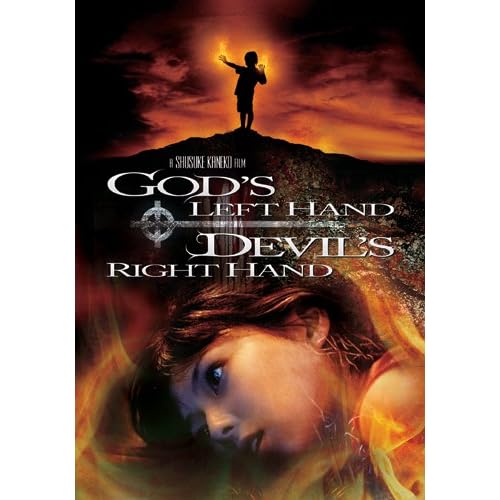
Shusuke Kaneko goes back to the horror genre of Nippon Eiga with his newest film to be released state-side "God’s Left Hand, Devil’s Right Hand". This film is a lot of things. First and foremost, it is a manga adaptation. It seems that since his success with the DEATH NOTE movie adaptations, Shusuke Kaneko is more adapt to direct films based on manga and anime rather tokusatsu. This is a trend that is still happening with him, considering his latest film "Pride" and his sequel to Ryuhei Kitamura’s "Azumi 2: Death or Love". The manga Shusuke is adapting this time around is Kazuo Umezu’s Kami no Hidarite, Akuma no Migite, a manga that has been called "ultra-violent". Surely, it is.
The main story revolves around a younger brother/older sister duo (Gamera 3 anyone? Or should I say this is influence from Yamato Takeru (with Amatseratsu and Susa-no-o?)). One night, Izumi - the older sister - is awakened by the calls of her younger brother - Sou (pronounced "so"). Sou seems to have a strange ability - his dreams are premonitions of evil happenings. However, when Sou dreams them, the same thing that kills the person he is dreaming of happens to him. He is still alive, but he is left wounded. Once taken to the hospital, Izumi stats recalling past conversations with her brother. Conversations involving violent acts and that Sou claims that he is going to die soon. But there are other quotes Izumi recalls. With that, she tries to save her brother by also saving the people he is dreaming about. It will ultimately lead her to a small town were a pharmacist and his paraplegic daughter are involved with the happenings, along with Ai Maeda (Gamera 3 coincidence? Nah, Shusuke and Ai are just good friends).
Shusuke’s directorial style is very, very different from any of his other work. His most violent work that I have seen was CROSS FIRE. But not it is this film. Being a horror film, it does stray from the usual stereotypes of J-Horror, such as ghosts and girls that make it obvious that they have long black hair. However, Shusuke does add a little bit of the supernatural, with Sou not only having dreams but having the ability to use the "Devil’s Right Hand" and "God’s Left Hand". Sou can also talk to his sister and other members of the cast telepathically also. He even does some major plot twister and mind bending stuff at the end.
Where things get weird is the deaths. This is a very gory movie. While the horror elements does have some John Carpenter-esque suspense, the deaths are closer to what Eli Roth or Darren Lynn Bousman would do. But while some of the deaths are something which would look cool, this is a Japanese movie and sadly Japanese studios do not have the same kind of budget as Hollywood films, so do not be surprised if some stuff comes off looking as "too fake". But there are some great concepts.
But what is the overall meaning of the story? Sure, there is a nice subtle use of the phrase "You are what you eat" in the story (regarding one of the deaths). Sure, Kaneko has said that he wanted this film to be a commentary on Japanese crimes, particularly saying, "In Japan, crime is becoming more serious and outlandish. Our victims are getting younger and younger. This film is expressing my anger against the people who perpetrate such crimes." And the film succeeds in that. However, the big thing with the film is something Sou says at the end of the film regarding adults "not getting it". Sou and Izumi’s parents don’t get it that what is happening in Sou’s dreams is real. Another person who doesn’t "get it" is the perpetrator of the grizzly crimes, the pharmacist with the daughter. He kills so that he would have substance to write stories, stories which his daughter likes to listen to (until she begins to realize that they are actual happenings and that the stories are just metaphors). Then we realize that there is a deeper motive for the killings - the pharmacist is tired of the task of being a father, being bugged all the time by his daughter and such. So while he is blinded of the moral consequences of his crimes, he is also blind of the responsibilities of being a father, especially of a seven year old paraplegic girl. Some adults just "don’t seem to get it".
When it comes to the acting, do not be expecting much. The actors pretty much play their character straight to a T. But nothing really new, though the actor for the pharmacist could give some the creeps with his variety of stares. The writing - which is done by someone else other than Kaneko this time around - is pretty much good. The score is forgettable though, but do look for a variation of the Stanley Kubric theme. The SFX are… well… not as good as any of Kaneko’s other works. But ya learn to live with it. The only thing I can dock from this film is the pacing. But once you watch it again, it gets better, kind of like it grows on you.
I give the film a 7.5/10. It’s not Shusuke’s best. But for a horror film, it is pretty good. Just be prepared, Kaneko brings us something very, very different from what we usually have had seen from him. Blood, guts, gore, and rolling heads. Not to mention my favorite scene: a girl being force-fed cake till she pukes and once she stops eating is decapitated. Blood, guts, puke, and cake. What more could you ask for in a film that isn’t HOSTEL or SAW?



